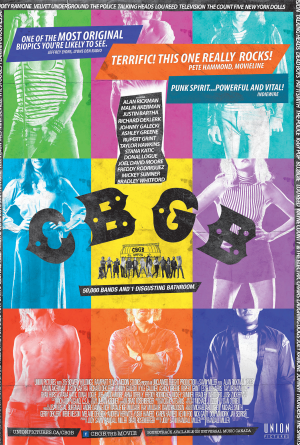
- Status: Now Playing
- Genre: Drama / Music
- Cast: Alan Rickman, Malin Akerman, Justin Bartha, Richard de Klerk, Johnny Galecki, Kyle Galiner, Ashley Greene, Rupert Grint, Estelle Harris, Taylor Hawkins, Stana Katic, Joel David Moore, Ahna O'Reilly, Freddy Rodriguez, Ryan Hurst, Mickey Sumner, Bradley Whitford, Josh Zuckerman
- Directed by: Randall Miller
- Written by: Randall Miller, Jody Savin
- Country of Origin: US
Trailer
Buy Now
Synopsis
In 1973, after two bankruptcies and an acrimonious divorce, the ever-determined Hilly Kristal (ALAN RICKMAN) borrowed money to buy the Palace Bar, a watering hole for the indigent of what was then New York’s seething skid row. Hilly had a dream. He wanted to give a stage to live musicians, albeit Country, Bluegrass and Blues musicians. Thus the acronym CBGB.
When it proved impossible to book the likes of Conway Twitty on The Bowery, Hilly opened his doors to local talent. The bands that came were primitive and unrehearsed, but by giving them a stage, Hilly gave them a forum in which to grow. Variously angry, nihilistic, political and raw, this music was a radical departure from the disco and ultra studio produced rock of the times. It was fundamentally DIY.
Audiences responded to the egalitarian nature of the CBGB bands. It was an antidote to the harsh socio-political times. Nixon was impeached. New York was on the verge of bankruptcy. Ford was refusing to bail the city out.
But the music did not have a name until Punk Magazine was established in the Connecticut basement of the parents of a young illustrator named John Holmstrom (JOSH ZUCKERMAN) who gave a signature look to the movement. Filled with irreverence and irony, the magazine lent a kind of aberrant formality to the downtown music scene.
Punk was born. And the world of music was changed forever.



